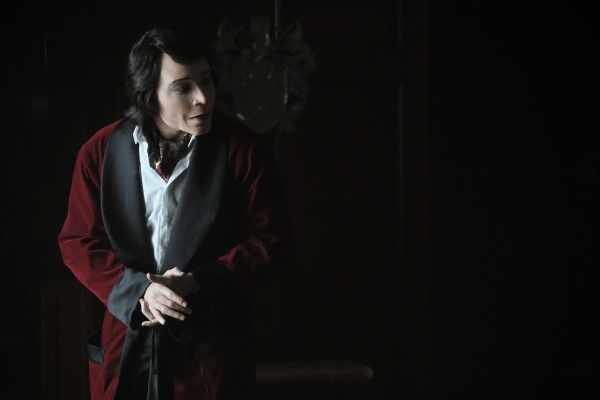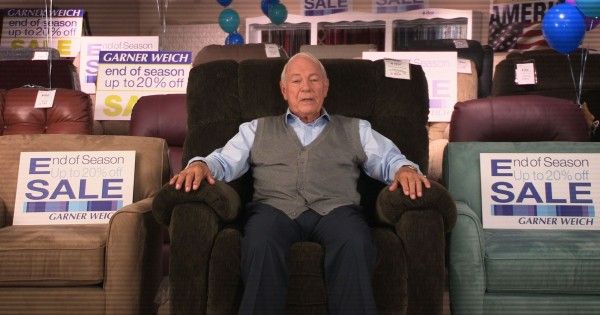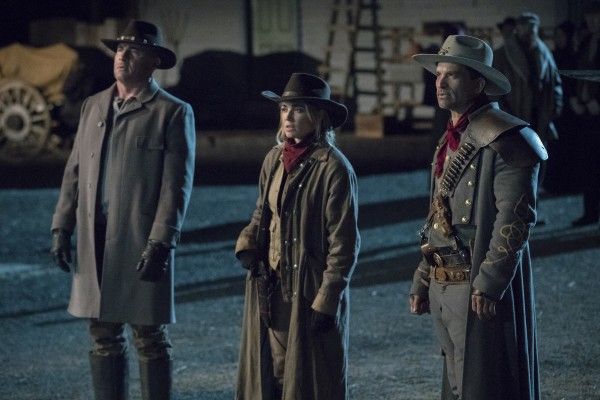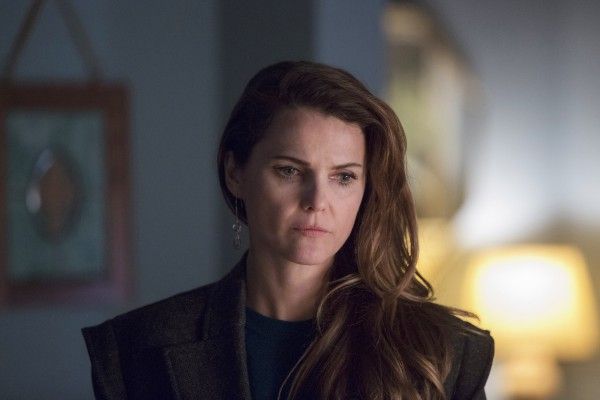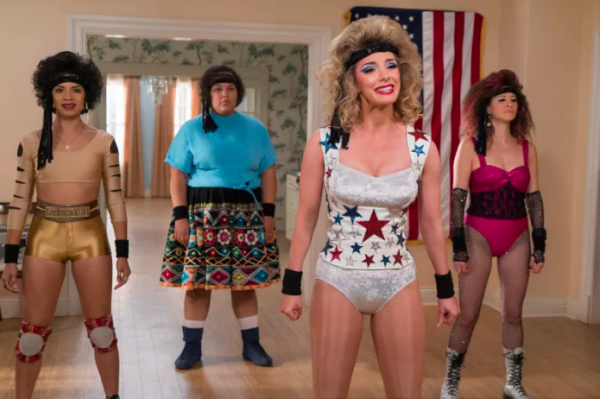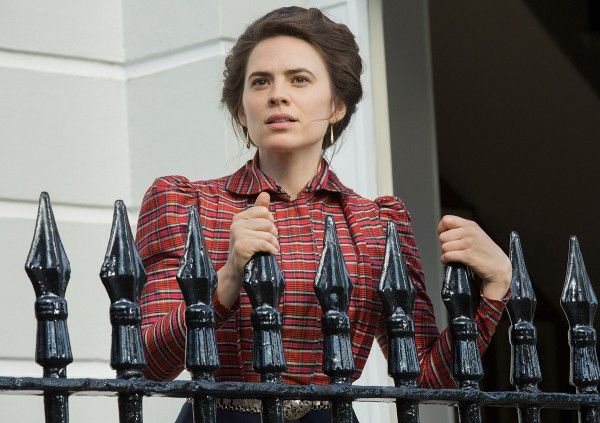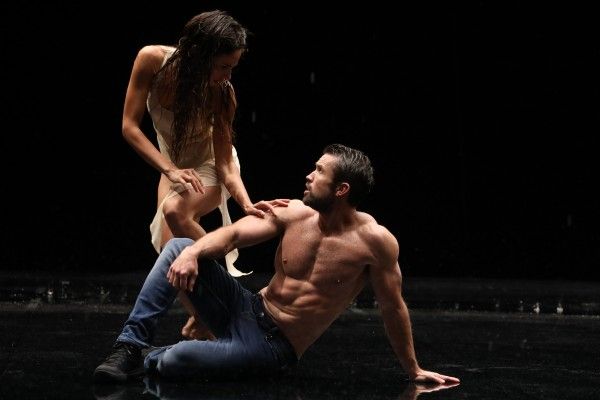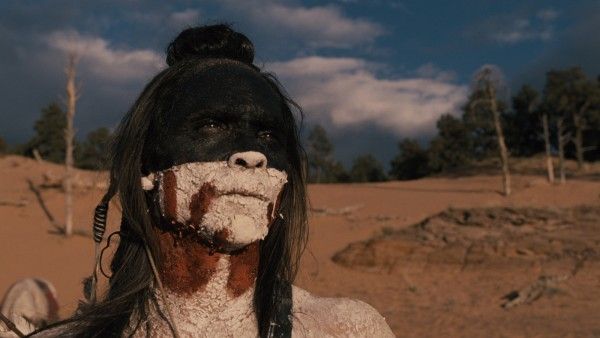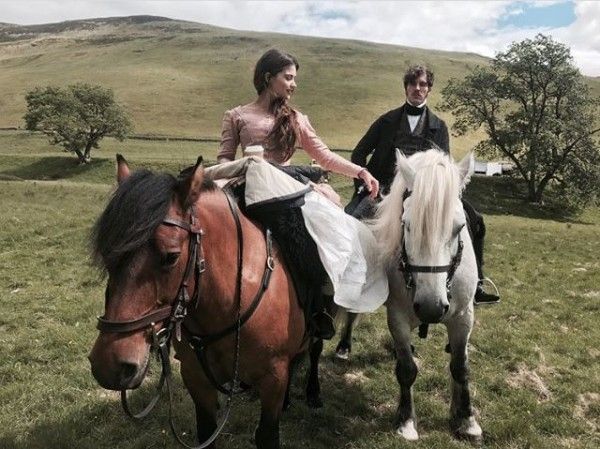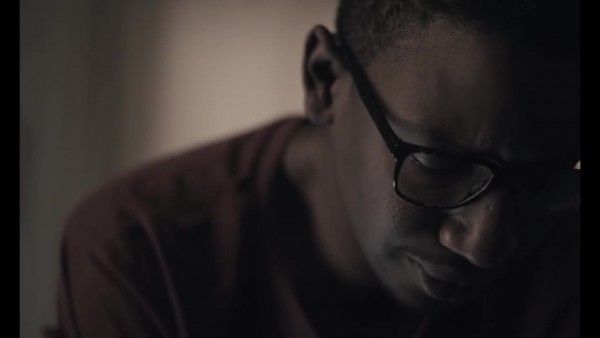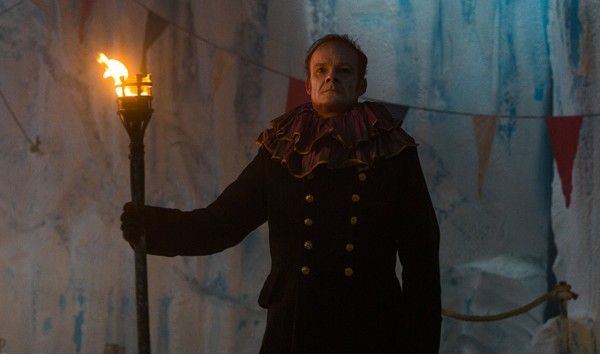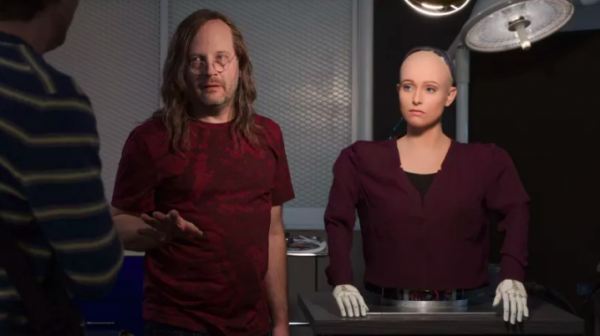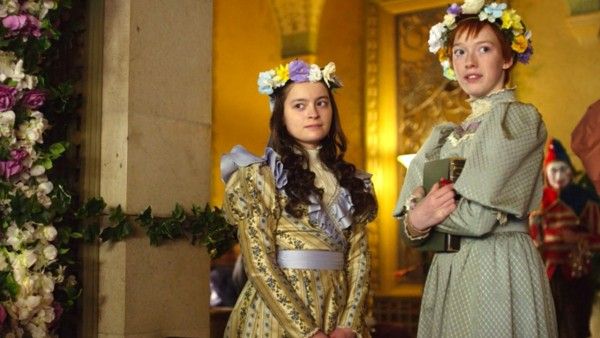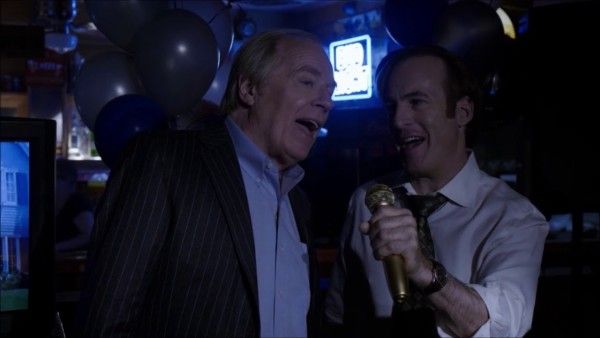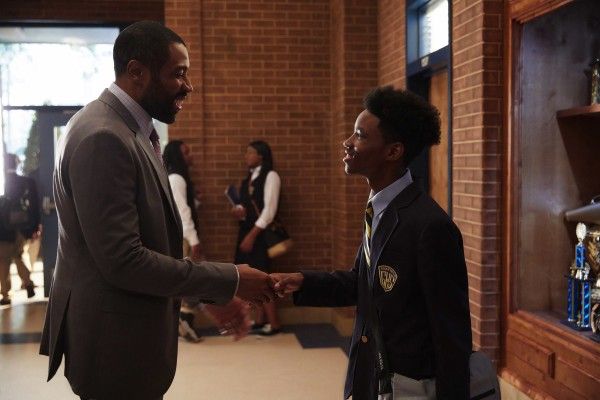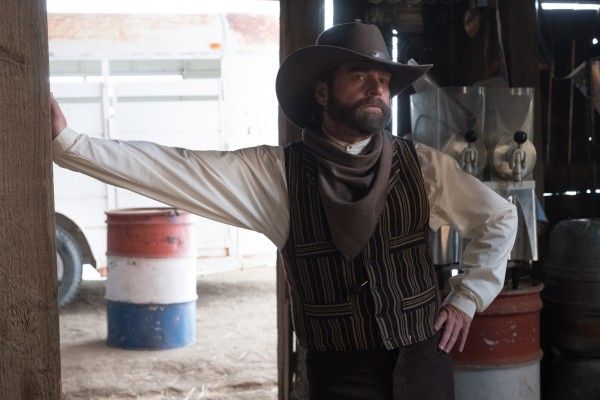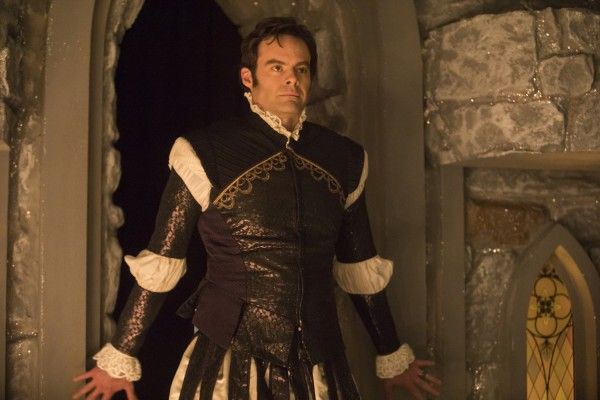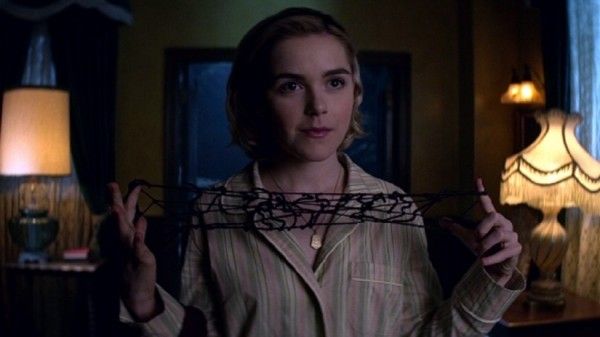For more of our Best of 2018 coverage, go here.
Year-end lists are all about celebration, and even though the deluge of television is pretty overwhelming, it's actually been a joy to look back at some of the funniest, most heartbreaking, and all-around memorable moments of the TV year.
There will be a lot of crossover with the best TV shows of the year, of course (as well as the best performances), but when it comes to specific episodes, there are some series from those lists that are excellent, and yet their episodes are so tightly intertwined with the overall narrative that they aren't represented here. For others that are highly episodic, like Atlanta or Legends of Tomorrow, I limited myself to just one episode per series. That was extremely hard, but worth it to not write blurbs for every single episode of Blue Planet II (every episode of Blue Planet II is the best episode). And why 26? Because I have 26 episodes I want to talk about.
And as must always be said when it comes to year-end lists -- with almost 500 scripted series on air, no list is definitive — these are just a few great selections from a year that was stocked with great small-screens stories. Share some of yours in the comments!
Spoiler note: I’ve kept things as general as possible, but if you are in doubt just skip on to the next!
“Teddy Perkins” - Atlanta
Writer: Donald Glover
Director: Hiro Murai
What more can really be said about this exceptionally crafted episode? “Teddy Perkins” is Atlanta and Donald Glover at their absolute best, weirdest, most horrifying and most profound. I could name almost any other episode of Atlanta’s house of horrors-themed second season as one of the best of the year, and they would all deserve it. Yet “Teddy Perkins” stands a cut above for its boldness, racial commentary, and frightening devotion to the creation of a character that haunts and delights everyone who watches. It’s outstanding.
"Nice Face" - Killing Eve
Writer: Phoebe Waller-Bridge
Director: Harry Bradbeer
From the start, Killing Eve presented itself as something special. From Villanelle (Jodie Comer) overturning a cup of ice cream on a trusting little girl to Eve (Sandra Oh) screaming herself and her husband awake because her arm fell asleep, “Nice Face” introduces us to its quirky cast of characters in revealing ways. Villanelle is a glamorous psychopath, and Eve is a hilariously strange MI-5 agent who both immediately admires Villanelle’s assassin work and is the only person to know the killer has to be a woman. Creator Phoebe Waller-Bridge infuses this series with her trademark wit, which is beautifully portrayed by both Oh and Comer, who put in career-best performances. As a premiere in a crowded TV lineup, “Nice Face” needed to not only introduce us to its characters and story, it needed to seduce us to keep watching. It did so easily, and with panache.
“Mort Crim” - Detroiters
Writer: Christopher Powell & Chip Hall
Director: Dale Stern
There was no series on this list that I struggled with more to pick just one episode from than Detroiters. The Comedy Central gem makes every single episode count, and there were a few line readings in “Trevor” that still make me laugh out loud (“Hark Motors” was another close contender). But the best representation of this wonderfully crafted (and woefully now cancelled) series was Season 2’s “Mort Crim,” which starred the Detroit broadcasting legend himself (on whom Anchorman was somewhat based). Though Crim made several other cameos in the series, like his “Chump of the Week” segment, here he took the reins to wonderfully comedic effect.
Knowing who Crim is (or even that he is in fact a real person!) heightened the humor, but one of Detroiters’ greatest accomplishments was never making anyone feel like they weren’t in on the joke. You didn’t have to be a Detroit native to get the humor, and yet, if you were (or live in a similar kind of post-industrial city looking to rebrand itself), it added even more exceptional layers to the jokes. But when it comes to specifics, seeing Mort Crim challenge ISIS while taping a couch commercial was one of the top TV moments of the year: “ISIS, let’s settle this thing once and for all. You choose your best man, you send him here to Garner-Weich, to fight me, Mort Crim. Winner take all. You win: America’s yours. I win, you give good old-fashioned democracy a try. What have you got to lose? There's a grand prize of $25,000, courtesy of my good friends at Garner Weich!”
"The Good, the Bad, and the Cuddly" - Legends of Tomorrow
Writer: Marc Guggenheim & Phil Klemmer
Director: Dermott Downs
Since its return from midseason, and up until the day before the finale, I had “Here I Go Again” as my pick for Legends of Tomorrow’s entry into this best episode list. It was a great episode, not only as part of Legends’ meta humor to do a time loop episode, but also in how emotional the story got at the end (and it was really a tour de force performance by Tala Ashe). But, "The Good, the Bad, and the Cuddly" cannot be denied. There’s a giant Beebo, folks, and some of the best one-liners in the show’s history. It brought together everything from the show’s crazy season into a really satisfying conclusion, and was full of both action and solid character moments. Like “Here I Go Again,” it was a great example of a superhero show that does it all, keeping things light even while the stakes are high. There was magic, mystery, mayhem, and Mallus. The only thing that could have been better was a dramatic performance of Mick Rory’s novel.
“Start” - The Americans
Writer: Joel Fields & Joe Weisberg
Director: Chris Long
Series finales are dreadfully tricky things. FX’s The Americans had the luxury of knowing the end was coming far earlier than many shows, and thus prepared a finale that was exactly on its own terms. And wow, was it. “Start” was not only a fantastic episode of The Americans, it was a really wonderful series finale in general. It worked to satisfy the story it had been telling for six seasons, which by extension satisfied fans even if it wasn’t what we expected, predicted, or may have even hoped for. But now, I couldn’t imagine it happening any other way. The entire final episode was more anxiety-inducing than any other the series has ever produced, which is truly a feat unto itself. The Americans is one of the best TV shows of all time, and “Start” solidified that legacy.
“The Good Twin” - GLOW
Writers: Nick Jones & Rachel Shukert
Director: Meera Menon
The eighth episode of GLOW’s second season has been somewhat divisive, but I for once unabashedly loved it. “The Good Twin” is a meta episode-within-an-episode, where we get to actually watch a half-hour of the GLOW TV show. It’s gloriously retro, poorly produced (purposefully, of course), and not just hilarious but incredibly endearing. It was a true surprise in an already great season, one that was full of nothing but pure joy. Bless.
"Episode 1" - Howards End
Writer: Kenneth Lonergan
Director: Hettie Macdonald
Though things get increasingly dramatic an complicated as it goes on (as things so often do), Starz’s limited series Howards End starts things off in a rather jaunty fashion. Beautifully costumed and decorated while operating at a swirling pace, it’s easy to get caught up in the series’ charms, especially those of Hayley Atwell, who stars as the de factor matriarch for her younger brother and sister after losing their parents. The series takes place at the turn of the 20th century, a moment of great change for English society, and there is much to be said about everything. The characters chatter away about it all in a wickedly smart sand snappy script by Kenneth Lonergan, adapting it from E. M. Forster’s novel. And while the whole miniseries (running an economic four episodes) is worthwhile, its opening act is particularly charming.
“Trademarq” - Corporate
Writer: Heather Anne Campbell
Director: Pat Bishop
Of all of Corporate’s satirical storylines in its first acerbic season about hellish office culture, none felt as (horribly) true to life as “Trademarq,” which (as I wrote about earlier this year) “is an extended riff on a Banksy-like artist who Matt (Matt Ingebretson) and Jake (Jake Weisman) admire, and who is hired by the very corporation he initially roasted in his art (the fictional Hampton DeVille). His job is to make logos that will sell mugs and t-shirts to the protestors he supposedly inspired, as their picketing essentially turns into Cochella. It is devastatingly cynical, but also completely transparent in its acknowledgement that our heroes are usually false idols, and the beat of global consumerism moves on with or without you.” It’s diabolical, and not out of the realm of possibility in terms of really happening. Granted, it’s not the episode that sees Hampton DeVille CEO (Lance Reddick) saying, “Great news! There’s going to be several wars,” but it spills many a cold and hard truth about corporate greed and our complacency with it.
“Mac Finds His Pride” - It’s Always Sunny in Philadelphia
Writer: Rob McElhenney & Charlie Day
Director: Todd Biermann
It’s Always Sunny has always found ways to be somehow creatively reliable over the course of its 13 seasons, and for most of the finale, “Mac Finds His Pride,” that remained true. The episode revolved around Mac being unsure how to define himself as a gay man, which led to some predictable hijinks as Frank took him on a tour of various outrageous examples, and Mac wanting to come out to his tough-as-nails convict father. But where everything changed -- and It’s Always Sunny shattered all expectations for what it could be -- was at the very end, when Mac performed an interpretive dance sequence to express what it felt like for him to be gay and wrestling with coming out.
And my Lord, it was beautiful. There was no gag here, not joke waiting to be told. Rob McElhenney worked exceptionally hard to make this everything it needed to be, pairing up with professional ballerina Kylie Shea and dancing to Sigur Rós’s “Varúð.” It was completely unexpected and astonishing, all the way through until the end, when Frank (of all people) delivered this beautifully devastating line that echoed back to an earlier moment in the episode: “Oh my God. I get it. I get it.”
"Kiksuya" - Westworld
Writer: Carly Wray & Dan Dietz
Director: Uta Briesewitz
In what has been an uneven second season of HBO’s Westworld, a few highly episodic hours have stood out, including “The Riddle of the Sphinx” — which introduced us to the idea of the park creating hosts for human consciousnesses to live in forever — and the fantastic "Kiksuya,” which answered all of our questions about Ghost Nation. Narrated by Zahn McClarnon, who plays Akecheta, we are transported back through Westworld’s past, seeing it from a new perspective, and learning about Akecheta’s quest for The Door along the way. It’s a fantastically moving story, one that manages to inject real humanity (ironic, yes) into a show that more often deals with slaughter. Gorgeously filmed by Uta Briesewitz, the episode is a quest for self, for truth, and for love, and is expertly and compellingly crafted.
“The King Over the Water” - Victoria
Writer: Ottilie Wilford
Director: Daniel O'Hara
In its second season, PBS’s Victoria became a little more episodic in its structure, with several standout stories that explored the young Queen’s early reign. None were perhaps as fun or unique, though, as “The King Over the Water,” where Victoria (Jenna Colman) and Albert (Tom Hughes) travel to Scotland. The two are able to let their hair down a little (for Victoria, rather literally), and spend time alone in the countryside. But after they end up getting lost, they spend the night at the residence of a poor farmer and his wife, not revealing who they are until they are recovered the next day. It was incredibly sweet to see how the couple could relax and feel free just for a fleeting moment, where they’re spoken to just like a regular married couple would be instead of with extreme deference. The cinematography of this episode is also stunning, with sweeping shots of the Scottish moors. “The King Over the Water” also features a long-awaited kiss between two male characters who have been hesitantly flirting and enjoying each other’s friendship, but that step takes things into new and very forbidden territory. The promise of what might come with that, as well as Ernest’s (David Oakes) pursuit of a recently widowed Duchess, and Victoria and Albert’s own sojourn, make this a particularly romantic hour that is also cozy and uplifting.
“17 Unheard Messages” - Sorry for You Loss
Writer: Jonathan Igla
Director: James Ponsoldt
One of the most poignant shows on the year was on Facebook, and it’s as much a surprise to me as it might be to you. While Sorry for Your Loss focuses on Leigh (Elizabeth Olsen) trying to cope with the sudden death of her husband Matt (Mamoudou Athie), the episode that packed the most emotional wallop focused on Matt himself. It was a stand-out for not only for being heartbreaking, but groundbreaking. We don’t know if Matt accidentally died or committed suicide, and this episode doesn’t answer that. But it does show Matt’s almost lifelong struggle with depression, and in doing so, works to discuss and destigmatize mental health issues, using a young black artist as one soul-crushing example. The way “17 Unheard Messages” makes sure that Matt is not just a ghost for Leigh to get over, but a man truly struggling under the weight of his demons, was breathtaking.
"A Mercy" - The Terror
Writer: Vinnie Wilhelm
Director: Sergio Mimica-Gezzan
The Terror was one of the most finely crafted TV series of the year, and almost every episode had standout moments. None created such a sense of nightmarish, horrific dread though as “A Mercy,” where the men are forced to abandon their ships in the ice and attempt to walk to a remote outpost in the hopes of being saved. To improve morale, Fitzjames (Tobias Menzies) organizes a carnival, which leads to some of the most outrageously frightening production design / costuming I’ve seen in quite some time. And just as Crozier (Jared Harris) comes out of his self-imposed seclusion, the carnival goes to hell as lead poisoning starts to take hold. Dr. Stanley (Alistair Petrie) thinks it would be better for the men — himself included — to die now, and enacts this plan with unexpected gusto. And yet, it’s hardly the beginning of the horrors, accidental and otherwise, that the remaining crew will face on this doomed journey. “A Mercy” was a dreamy hellscape of an episode, and one of the most visually and emotionally powerful of the year.
"Facial Recognition" - Silicon Valley
Writer: Graham Wagner
Director: Gillian Robespierre
After T.J. Miller left Silicon Valley, there was a question of whether the show would be as good without Erlich’s outrageous presence. Turns out, it was even better. Plus, it made room for other characters to get more screen time, including Jared (Zach Woods), who had some of his best moments yet. The most compelling was in the episode "Facial Recognition,” where a new AI company is added to PiperNet. Richard (Thomas Middleditch) soon meets Fiona, a humanoid robot, who eventually calls out to Richard through Pied Piper’s servers looking for help escaping her creepy creator Ariel Eklow. It’s an episode that plays with the idea of AI consciousness (and fears about that), male abuse of power, and acts as a showcase for Jared’s loneliness and compassion for a machine — which leads to a hilariously horrifying reveal later on when he has to say goodbye to Fiona. The episode is richly layered with its storytelling, but also keeps a deeply human connection throughout. Most importantly for this show, it also mines all of this for humor in unexpectedly fantastic ways.
“Memory Has as Many Moods as The Temper” - Anne with an E
Writer: Jane Maggs
Director: Anne Wheeler
Netflix’s adaptation of Lucy Maud Montgomery’s Anne of Green Gables started off, in its first season, as a somewhat faithful but very dark take on a beloved Canadian classic. But in its second season, the show left the books entirely, and was better for it. In coming into its own, Anne with an E also became lighter and more charming (as it should be), and even though it pushed a very progressive story without much nuance, it really made it work. “Memory Has as Many Moods as The Temper” was a gorgeous example of this, as Anne and her friends go to visit Diana’s rich and elderly Aunt Josephine, who is out as a lesbian to her circle of artists and friends but not to her family. The three children experience the magnificent party she throws in various ways, from wariness to burden-lifting self-acceptance, but the stunning and cozy visuals of this lush turn-of-the-century soiree are truly wonderful to behold, and a great example of how far the show has come.
“Winner” - Better Call Saul
Writer: Peter Gould & Thomas Schnauz
Director: Adam Bernstein
Until I got to Better Call Saul’s Season 4 finale, “Winner,” it was “Something Stupid” which was my pick for one of the best episodes of the year. The split-screen start that showed how Jimmy and Kim were drifting apart as Jimmy leaned into his Slippin’ lifestyle was expertly done and really affecting, but ultimately it couldn’t hold a candle to “Winner.” Not only did the finale open with an emotional and unexpected flashback to Jimmy and Chuck in better times, singing karaoke, and looking out for one another, it ended with one of the most chilling cons Jimmy has ever run — because it was on us. The rest of “Winner” was also full of emotionally telling scenes, as Jimmy prepares for that final reveal. And when it comes, it packs one hell of a punch.
"The Resurrection" - Black Lightning
Writer / Director: Salim Akil
It might have been hard for other shows to live up to the hype that Black Lightning had leading up to its start, but the premiere episode, “The Resurrection,” set a tone and a promise for an outstanding season to come. The CW series’ pilot episode was strong, political, and unlike anything else we’ve seen with DCTV. Yes, Jefferson Pierce (Cress Williams) does take his first steps to becoming the vigilante hero again in this episode, but not fully. It gives us a taste of the kind of pacing and restraint the series would continue to employ throughout the season, including the storylines where Jefferson’s daughters also get their powers. There’s plenty of action, but there’s also a lot of time spent with Jefferson’s family and with his day job as a high school principal. It was a strong, powerful opening for a show that successfully broke the superhero TV show mold.
“Crash” - Baskets
Writer: Danica Radovanov & Jonathan Krisel
Director: Jonathan Krisel
There were so many outstanding moments that revolved around Christine (Louie Anderson), the Costco-loving mom whose heart and soul is the center of FX’s Baskets, in the show’s third season. But “Crash” was entirely devoted to seeing Christine pushed to her limits, and the results were extremely emotional. It starts with her trying to find a way to help out Eddie the cowboy, a drunkard who reminds her of her father, which is all revealed in startlingly sad flashbacks. But Christine is also alienated from her friend group, particularly after Eddie ruins a party she throws by showing up drunk. It causes Christine not only to call Eddie into account, but in doing so, she becomes acquainted with a local Korean church (that Eddie smashes his car into), a storyline that the show pursues beautifully in subsequent episodes. Baskets being Baskets, there’s also plenty of fantastic humor, including a surprisingly sweet arc where Chip’s former Arby’s manager Jody and his pregnant girlfriend end up helping out with the rodeo and receiving some unexpectedly solid advice from Chip. It’s the perfect example of the fine line the series walks between the crude and the heartfelt, and Anderson gives a particularly moving performance.
"Chapter Seven: Loud, Fast, and Keep Going" - Barry
Writer: Liz Sarnoff
Director: Alec Berg
Every time I’m asked if Bill Hader’s HBO series Barry is a drama or a comedy, funny or emotional, I say it’s everything. To experience Barry is to go on a completely unexpected journey of joy, humor, sadness, and violence, all of which culminates in “Chapter Seven.” There are a lot of interesting and tense moments early in the episode, but my focus here is what happens later, when Barry’s (Hader) personal and professional lives collide in a soul-crushing way. Throughout the season we’ve seen Barry get some hope that he could leave his life as an assassin behind, make real friends, and have a future that might involve love and actual happiness. In pursuing that, though, he got people involved with his violent life who should never have been, and to stop them from blowing up his dreams for the future, he has to make a horrific choice. The scene itself is brutally emotional, and then doubled-downs when Barry — who had been visualizing the many pompous ways he might deliver Shakespearean lines to assist his crush during her big moment on stage — arrives to a long-awaited performance a little late, in a state of emotional breakdown, and delivers his lines with the raw sincerity of a true actor. To find his voice and his freedom, he had to lose his soul. It’s a damning moment, and one of this year’s most emotionally excruciating episodes.
“Chapter Five: Dreams in a Witch House” - Chilling Adventures of Sabrina
Writer: Matthew Barry
Director: Maggie Kiley
One of the best things about Chilling Adventures of Sabrina was how episodic it was — a rarity for Netflix series, which are often crafted with a binge model in mind. But “Chapter Five” in particular showed how well the series handles a “villain of the week” setup, or in this case, “demon of the week.” The dream demon (who was created mostly with practical work, something else to laud Sabrina over) that antagonized the Spellman household did have the effect of revealing key character fears and desires for each of the leads, but most especially regarding the fraught relationship between sisters Hilda (Lucy Davis) and Zelda (Miranda Otto). Yes ultimately everyone learned a lesson, but no one admitted it, eschewing any kind of “hugging it out” TV trope. It felt real, and for an episode that includes Madam Satan hilariously touring around people’s dreams and accidentally walking in on things she didn’t want to see, that’s saying something.


